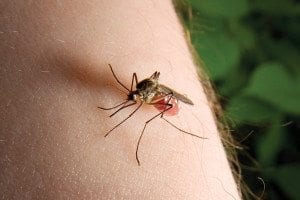
Protecting Construction Workers from Zika
You may not think Zika affects you, based on your location. But if your workers travel to other states for work or pleasure, they may very well be affected. Take a look at these tips to start protecting construction workers from Zika now
By Jennifer Morrell
Mosquitoes have long been the outdoor pests we’d love to see disappear. Now, we have a new reason to dislike these pesky insects: the Zika virus.
The Zika virus is spread to people through the bites of Aedes mosquitoes. The most common symptoms of Zika are fever, rash, joint pain, and red eye (conjunctivitis), says the Centers for Disease Control (CDC). The illness is usually mild, with symptoms lasting up to one week, and many people do not have symptoms or will have only mild ones. However, a Zika virus infection during pregnancy can cause microcephaly, a serious birth defect, as well as other severe brain defects.
Locally acquired cases of Zika were mostly found in Florida, per a November 2016 report conducted by the CDC. However, when factoring in the cases where Zika was acquired due to travel, California and New York were highly affected as well. Further, every state except for Alaska has had reported cases.
If you live in a state that is not considered to be at high risk for Zika, you still should focus on basic housekeeping tasks for the jobsite. Preventing Zika from manifesting on your jobsite is important. For example, you can rid your jobsite of sources of standing water, such as tires, buckets, cans, bottles, and barrels. Standing water provides the perfect breeding area for mosquitoes. If your jobsite is beside or near an area that may contain such breeding areas, you might consider treating your jobsite for mosquitoes.
Protecting your workers
Workers who are exposed on the job to mosquitoes or the blood or other body fluids of infected individuals may be at risk for occupationally acquired Zika virus infection, says the Occupational Safety and Health Administration (OSHA).
OSHA recommends that employers of outdoor construction workers inform those workers of the risks of exposure to the Zika virus through mosquito bites, and train them to protect themselves. The provision of insect repellents is a significant step an employer can take.

You can not only help protect your employees while they work, but also protect your jobsite environment.
“I cannot stress enough the importance for patients to take all the necessary precautions to limit their exposure and reduce the risk of contracting the Zika virus, when traveling to regions with known Zika outbreaks,” says Dr. Richard Mersberger, a family physician with North Atlanta Primary Care. “Since the individual often has no symptoms following exposure to the virus, or symptoms similar to most other viral infections, it is important for patients to recognize those potential symptoms.”
Regarding insect repellents, OSHA suggests the use of repellents containing an EPA-registered active ingredient. Research suggests that repellents containing DEET (N,N-diethyl-m-toluamide) or picaridin (KBR 3023) typically provide longer lasting protection than the other products, and oil of lemon eucalyptus (p-menthane-3,8-diol) provides longer lasting protection than other plant-based repellents. Permethrin is another long-lasting repellent that is intended for application to clothing and gear, but not directly to skin.
In general, the more active ingredient (higher concentration) a repellent contains, the longer it will protect against mosquito bites, OSHA says. Choose a repellent that provides protection for the time spent outdoors. Never spray aerosol or pump products in enclosed areas, and never directly on the face. (Spray it on the hands, and then spread it on the face, avoiding contact with eyes and mouth.)
Outdoor construction workers may need to use sunscreen in conjunction with insect repellent. However, due to a decrease in SPF when using a DEET-containing insect repellent after applying sunscreen, users may need to reapply the sunscreen more frequently.
Clothing and other personal protection equipment can play a role as well, says OSHA. Workers should be provided with and encouraged to wear clothing that covers their hands, arms, legs, and other exposed skin. This would include hats with mosquito netting to protect the face and neck. Socks should cover the ankles and lower legs.
In warm weather, workers should be encouraged to wear lightweight, loose-fitting clothing to protect against the sun’s harmful rays and create a barrier to mosquitoes.
OSHA also suggests that, if requested by a worker, an employer consider reassigning anyone who indicates she is or may become pregnant, or who is male and has a sexual partner who is or may become pregnant, to indoor tasks to reduce their risk of mosquito bites.
Zika Prevention
The CDC offers the following advice for overall prevention of Zika, for which no vaccine currently exists.
Clothing
- Wear long-sleeved shirts and long pants.
- Treat your clothing and gear with permethrin or buy pre-treated items.
Insect Repellent
- Use Environmental Protection Agency (EPA)-registered insect repellents with one of the following active ingredients: DEET, picaridin, IR3535, oil of lemon eucalyptus or para-menthane-diol, or 2-undecanone. Always follow the product label instructions. When used as directed, these insect repellents are proven safe and effective even for pregnant and breastfeeding women.
- Do not use insect repellents on babies younger than 2 months.
- Do not use products containing oil of lemon eucalyptus or para-menthane-diol on children younger than 3 years.
At Home
- Stay in places with air conditioning and window and door screens to keep mosquitoes outside.
- Take steps to control mosquitoes inside and outside your home.
- Mosquito netting can be used to cover babies younger than 2 months old in carriers, strollers, or cribs.
- Sleep under a mosquito bed net, if air conditioned or screened rooms are not available, or if sleeping outdoors.
Sexual Transmission
- Prevent sexual transmission of Zika by using condoms or not having sex.
For updated information on OSHA’s interim guidance for protecting workers from occupational exposure to Zika virus, visit www.osha.gov/zika. For more information on Zika, visit www.cdc.gov/zika.



